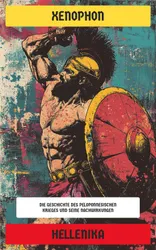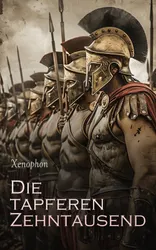Xenophon's "Hellenica" serves as a crucial historical narrative that chronicles the final years of the Peloponnesian War and the ensuing events of the Greek world up to 362 BCE. Written with a clear, engaging prose style, the work exhibits Xenophon's unique perspective as both a soldier and a historian, combining firsthand observation with extensive research. Unlike Thucydides' more analytical approach, Xenophon's narrative is infused with a sense of moral inquiry and character analysis, reflecting the tumultuous political landscape of post-war Greece and showcasing significant figures like Socrates, Alcibiades, and the Spartan leaders. The text is not merely a historical account; it is an exploration of ethical leadership amidst civic strife, placing it firmly within the tradition of classical historiography. Xenophon, an Athenian-born soldier, philosopher, and student of Socrates, drew upon his experiences in various military campaigns and his disdain for the chaotic political environment of his time to compose "Hellenica." His background in philosophy profoundly influenced his insights into leadership and virtue, shaping his interpretations of historical events. Living in a transitional period marked by the decline of Athenian power, his work reflects both his love for Greece and his desire to provide an enduring evaluation of its political and ethical conditions. "Hellenica" is essential reading for those interested in ancient Greek history, military strategy, and ethical philosophy. Its multifaceted approach renders it not only a source of historical knowledge but also a profound commentary on the nature of power and morality. Readers seeking to understand the foundations of Western thought and leadership will find Xenophon's exploration illuminating and relevant.

Die Geschichte des Peloponnesischen Kriegs (Komplette Ausgabe: Buch 1&2) : Die Geschichte von Thukydides: 431-411 v.Chr. + Fortsetzung von Xenophon: 411-362
Thukydides, Xenophon
book
Hellenika : Die Geschichte des Peloponnesischen Krieges und seine Nachwirkungen
Xenophon
book
Die tapferen Zehntausend
Xenophon
book
50 Meisterwerke der Philosophie : Metaphysik, Das Gastmahl, Bhagavadgita, Tractatus logico-philosophicus, Kritik der reinen Vernunft, Also sprach Zarathustra, Selbstbetrachtungen von Marcus Aurelius
Ludwig Wittgenstein, Edmund Husserl, Karl Marx, Sören Kierkegaard, Friedrich Nietzsche, Ralph Waldo Emerson, John Stuart Mill, Georg Wilhelm Friedrich Hegel, Friedrich Schelling, Johann Gottlieb Fichte, Immanuel Kant, John Locke, Montesquieu, Jean-Jacques Rousseau, David Hume, Gottfried Wilhelm Leibniz, Baruch Spinoza, - Konfuzius, Lao Tse, Platon, Xenophon, - Aristoteles, Marcus Tullius Cicero, Seneca, Epiktet, Marc Aurel, Plotin, Thomas von Aquin, Nicolaus von Cues, - Erasmus von Rotterdam, Niccolò Machiavelli, Tommaso Campanella, Martin Luther, Giordano Bruno, Samuel von Pufendorf, Abbé Castel de Saint-Pierre, Michel de Montaigne, René Descartes, Francis Bacon, Blaise Pascal
book
Die Geschichte des Antiken Griechenlands: Wesentliche Werke und Handbücher : Geschichte, Mythologie, Philosophie und Literaturklassiker
Herodot, Thukydides, Xenophon, Jacob Burckhardt, Johann Gustav Droysen, Ludwig Preller, Gustav Schwab, Homer, - Äsop, Platon, - Aristoteles, - Sophokles, Euripides, - Aristophanes, Alkiphron, Lukian, Aischylos
book
Handbücher der Geschichte: Antikes Griechenland : Griechische Kulturgeschichte; Herodots "Historien"; Thukydides' "Geschichte des peloponnesischen Kriegs"; Xenophons "Anabasis"; Ilias und Odyssee
Johann Gustav Droysen, Jacob Burckhardt, Herodot, Thukydides, Xenophon, Ludwig Preller, Gustav Schwab, Homer, - Äsop, Platon, - Aristoteles, - Sophokles, Euripides, - Aristophanes, Alkiphron, Lukian, Aischylos
book
Xenophon's Erinnerungen an Sokrates : Weisheit und Lehren eines antiken Philosophen in den Erinnerungen seines Zeitgenossen
Xenophon
book
Meisterwerke der griechischen Literatur : Ilias, Odyssee, Antigone, König Ödipus, Medea, Agamemnon, Lysistrate, Die Kyropädie, Das Gastmahl, Metaphysik
Euripides, - Aristophanes, Homer, - Sophokles, Aischylos, Herodot, Thukydides, Xenophon, Platon, - Aristoteles, - Äsop, Alkiphron, Lukian
book
Philosophie der Antike : Nikomachische Ethik, Metaphysik, Organon, Physik, Alkibiades, Das Gastmahl, Der Staat, Handbüchlein der Moral, Vom Redner
Mark Aurel, Platon, - Aristoteles, Xenophon, Seneca, Marcus Tullius Cicero, Epiktet
book
Die größten Philosophen der Antike : Die wichtigsten Werke von Platon, Aristoteles, Cicero, Seneca, Marcus Aurelius
Platon, - Aristoteles, Seneca, Marcus Tullius Cicero, Epiktet, Xenophon, Mark Aurel
book
Die größten Klassiker der griechischen Literatur : Ilias, Odyssee, Antigone, König Ödipus, Medea, Lysistrate, Agamemnon, Der gefesselte Prometheus, Die Kyropädie, Das Gastmahl
Homer, - Sophokles, Euripides, Aischylos, - Aristophanes, Herodot, Thukydides, Äsop, Xenophon, Platon, - Aristoteles, Epiktet, Lukian, Alkiphron
book
Die größten Klassiker der Philosophie : Also sprach Zarathustra, Utopia, Phänomenologie des Geistes, Neues Organon, Selbstbetrachtungen, Das Gastmahl, Nikomachische Ethik
Immanuel Kant, Sören Kierkegaard, Edmund Husserl, Ludwig Wittgenstein, Friedrich Nietzsche, - Konfuzius, Platon, Xenophon, - Aristoteles, Lao Tse, Marcus Tullius Cicero, Marcus Aurelius, Plotin, Thomas von Aquin, Niccolò Machiavelli, Thomas Morus, Giordano Bruno, Michel de Montaigne, René Descartes, Francis Bacon, Blaise Pascal, Baruch Spinoza, Gottfried Wilhelm Leibniz, David Hume, Jean-Jacques Rousseau, Friedrich Schelling, John Locke, Georg Wilhelm Hegel, John Stuart Mill, Karl Marx
book
